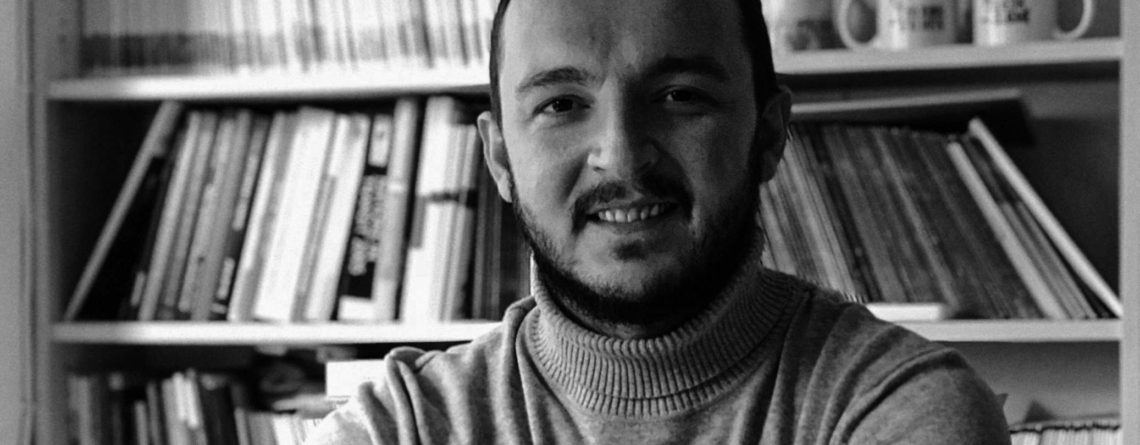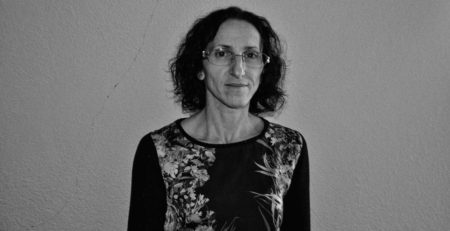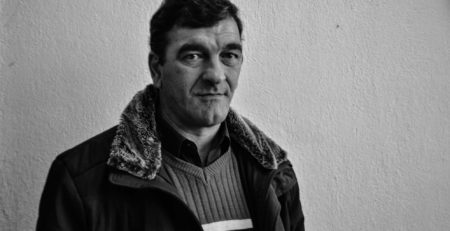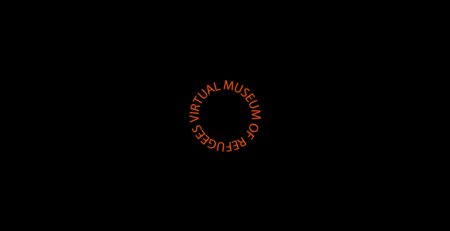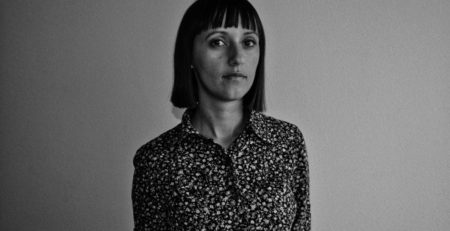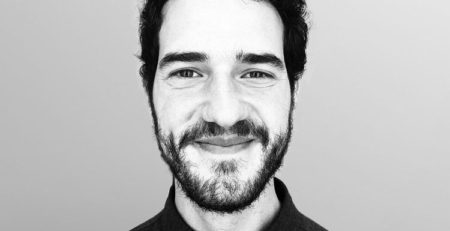Rasim Alija
Bjeshka Guri (interviewer)
Rasim Alija (interviewee)
Acronyms: BG=Bjeshka Guri, RA= Rasim Alija
RA: I completed Master studies in Political sciences, Civil society, local development. I work in Prishtina. I come from a village in Gjakova but I live in Prishtina. I work in the Institution for Democracy and Development. I work as a research and policy analyst.
BG: What are your first memories of war?
RA: Actually, every time we talk about the war, there 3-4 moments that mark all of my memories. The first moment was on April 4, when we decided to escape from the village, from Bec village exactly, in the municipality of Gjakova. I remember the organization of women, men, children, young boys at the time, and the speed at which we left, leaving all the other parts of live which you had tried for years to build and live until that very moment. And the idea of leaving your country, taking a road whose destination you do not know, you do not know where you are going to end up and, above all, you do not what the journey will be like. The first moment, a bit comic maybe, before getting into our cars, or tractors – because the majority of our villagers and cousins escaped with tractors. I even remember the improvisations in tractors, the sheds covered with tarpaulins to shelter from the rain. Those who could do it, quickly. The comic moment was when my dad was categorically against leaving. A very fierce debate took place between my dad and my mum. My dad said we should not leave, we can… there is a meadow near our house where the road can be seen, the highway Gjakova – Prishtina, and the meadow can be seen clearly from the road. He said let us write “HELP” there. We can write it with something and perhaps…It was the period when NATO had already intervened in Kosovo and he believed they could help us. The debate between my mum and my dad lasted, our other cousins where all getting ready to leave. It laster for about half an hour until my mum, at a certain point, said to my dad, “Okay, you decide. I am taking the kids and we are leaving”. In the last minutes I remember hiding my 6th grade books in our house’s yard. This was the ultimate separation from our house, when I hid my 6th grade books and marked the place where I hid them with a fire wood, and I always try to remember where I put them; this attempt not to forget their location followed me during the entire journey. I tried to remember the place where I hid the books. During our two and half months’ stay in Albania, I focused my entire memory on trying not to forget where I hid my 6th grade books. This was the first part of separation from the house and the place where I grew up, the place where we all grew up. Then we set off, and there was a long queue. What is important after that is the three-day journey we did. We escaped by the road Gjakova-Prizren-Vërmica. There are about 3-4 moments very…both interesting and memorable. It is the moment when…In the suburbs of Prizren after the war there was a bazaar where traders from Albania used to sell. They would come to sell. We waited for 3 or 4 hours in the queue. At that time, that market was open, and, without knowing about it, we decided, with a group of boys my age, to leave the queue and go to the market. I remember there were several huts with chocolates, candies, in one part of the bazaar. I even remember the first time we took a package of mint chewing gum, with the pictures they had. And it was such an increadible experience although we knew we had done something wrong, and we broke something at the bazaar and we were now afraid, especially for the fact that we were in a queue, still now knowing where we would go, where we would end up. Then, the part of returning, when we came back with the things we had taken was quite traumatic because all our family members were terrified for the fact that we had broken something, and they used to say, “Do you know what is going to happen to us now?” And the expression, “Do you know what is going to happen to us” made this experience even more shocking, although as an 11 or 12 year old, there were some even younger, we did not think we had done something too bad. We were just trying to do something we could experience as children. I remember the scenes of the four day queues in Morina, Vërmica, at the Albanian border. On the road there were valuable things that people had thrown while fleeing. You could see fridges, TVs, jewelry, weapons…all kinds of things which they had thrown on both sides of the road during the queue while escaping. Another difficult moment was just before joining the queue, actually on the border between Kosovo and Albania, in Morine. Suddenly, a Serbian soldier came and asked for a cigarette. My close family and I were in a car, the five of us. We had a Yugo. Plus my aunt, six of us. Imagine a Yugo car with very little space, six of us were there. And the soldier came and asked for cigarettes. We did not have any to give him and in a second – maybe it was longer than that but I had the impression that it was a matter of a second – two or three meters further we saw him on the ground. At that moment, 3-4 minutes later, it was the first time that we saw all the other surrounding villages, Vërmica particularly, and the houses got burned. Then, after 10 or 15 other minutes, we understood that the soldier had been killed. Someone killed him from Pashtrik’s peak, probably from the guerilla. But, what I wanted to say is that soldiers than came at our car, our Yugo, and wanted to get us out of the car. Another soldier intervened, a Serbian soldier, and kept away the soldiers that wanted to take us out of the car. I do not know what they said in Serbian. We proceeded to get in the car. My dad had already got out, my mum too had got out the car. That was the most traumatic moment during the entire part of the queueing since leaving Gjakova…Oftentimes, in conversations with my family, we thank the soldier because, after the request of the other part of the soldiers, we do not know what could have happened to us after that. A million options were possible, and we feel grateful towards the soldier who returned us in the car. Another moment that I always think of is when we proceeded to the other part of the border, that is now the custums part between Kosovo and Albania, and handing in all the ID cards, the removal of plates and the moment of crossing the border. My uncles were also there with us in the queue. I remember getting out of the car with my mum and going to see her family who had crossed the border. They were on a tractor. A 40-member family with little babies. There is a moment that can never forget. My grandfather, my mum’s father in this case, was a very authoritative persons, strict, with mustache, in a 40-member family, with the system of the time, with towers and such things, family was the main pillar for him, and for someone to see him crying or getting weak was not manhood. For the first time I saw my grandfather crying and saying that we would never be able to go back. Perhaps being accustomed to my grandfather’s authority and his figure of a rigorous person, for me that was probably a signal which I have always remembered that we would never return to Kosovo. That was the part that always accompanied me, my grandfather’s tears and him saying “we will never go back again”. I often remember his face of a man with moustache, very authoritative, tears rolling down his face. Then, we stayed for two days in Kukës, to take a very interesting road and to go to a place called Shëngjin. We are among the rare ones who, with 40 other families, took the road to go to Shëngjin. Why did we go to Shëngjin? As a village, we live with catholic community, we share the yard with them. There were both Catholics and Muslims, as well as tekke in our village. Many religions and quite a good relationship both before and after the war. Someone from the village found out that there is a church in Shëngjin of the Italian mission, and that they were able to admit us there. So we headed to Shëngjin, but what happened during the road was terrible. My dad’s uncle was also in the queue with us, travelling with a Golf 2, which he preserved very fanatically even during the war because his son had sent it to him from abroad. He was in the car with his two daughters, his wife, and his niece. Before arriving in Shëngjin, two masked persons stop him and want to rob his car. They first tried to touch the girls, and then after they resist, they try to rob his Golf 2 car. He is very keen on cars and since the car was a gift from his only son living in Sweden, he did not accept to give the car to them, so they kill him. They kill my dad’s uncle. And there begins a completely different saga, an experience of mixed feelings although I always remember as a kid, probably also living at the border with Albania and being able to watch the Albanian Radio Telelvision, I grew up watching its programmes and especially the riots of ’97, there was an impression about Albanians in our region, or an expression that I often heard as “rebels”. And, imagine, the first confrontation with Albania was an accurate evidence of what they used to say about them. It was unbelievable how we had tried to survive all those sacrificies during the four past days, seeing horrible things, even bombings at the bridge of Bishtazhinjë in the suburbs of Gjakova, which I forgot to mention. It was not even half a day after we set off, we went past the place that the Serbian forces bombed. They had also murdered people at the Bishtazhinjë bridge. We had tried to escape all those things. Also the case when a Serbian soldier enabled us to return to our car and continue the road, to come to Albania and be robbed and murdered for a car. This was the most shocking part. Then I remember when the news was broke, my father’s emotional reaction in the car until we arrived in Shëngjin. It was new for us but also for my brother and sister, although they were younger. But I have quite bad memories of those moments, meaning that people lose themselves in such cases, in such losses, and especially after a triumph when you manage to go through all those things and you have the feeling of safety and freedom, and seeing a family member being murdered in the country that is supposed to provide safety and freedom. This is where this saga ends, from what I remember until Shëngjin. Then the part in Shëngjin was the best part of war memories which, apart from my family, people were seeing the sea for the first time. Imagine, some had left a rural area, in war condition, and had gone somewhere in Shëngjin and we were placed in the simple, communist system hotels in the area where there are now apartments along the beach. So some of us were located there. That part is still there, the church. Everytime I go to Shëngjin I visit the church. We stayed in the church’s yard. The distance from the church’s yard to the beach or the view from the sea was 150-200 meters. And that was quite interesting, to see the others’ reaction when we went to Shëngjin. We arrived in Shëngjin on April 6 or 7, and we returned to Gjakova on June 14, on the 16th or 17th, so we stayed approximately two or three months in Shëngjin. They treated us extremely well, so with the help of the Church and the nuns we started building a new life. When I say a new life, I really mean it. Something interesting that happened is that all families that lived together while in Kosovo, when we went there they started separating, even families with 30 members. I think it was a direct influence that families saw that they cannot live in that system. I remembered this part later and thought about it. I saw its influence. Families started separating, staying only with the close family members: husband, wife, and children. Not with their uncles. We lived in huts. They treated us incredibly well. We started living a new life. We even started going to school. I went to school in Shëngjin, maybe a month or one month and a half. The church continuously organized English courses, piano and guitar lessons too. For us it was an entirely different system there. This is the first part. The second part is the volume of aids that the camp provided us in Shëngjin. I remember that there were so many aids and variety of things we consumed that there was a moment when we were full and…It was also the first time I tried the chocolate brand Toblerone, and there were so many Toblerone that we started to throw them away because there was too much of them. It was interesting because most of the aids were of this kind as well as canned food, but there were not any fruits or vegetables. So people started giving them to the citizens of Shëngjin in exchange of fruits and vegetables which was a very interesting trade. These are my memories of the entire experience in Shëngjin.
BG: Did you listen to any news about Kosovo?
RA: Yes. Actually, two of my eldest brothers were with us in the queue with their families but for some reason they remained in Kosovo. And for a period of two months we did not have any news about them. We did not know whether they were alive or not, or what happened to them. I remember that we tried to go to another city in Albania where other people were staying who had come from the same area to find out whether they had seen them or met them. My family members tried to do this. It is important to mention another thing. We had prepared a show with the other students at the camp. And I remember a dancer called Çeliku came there; he was a dance icon in Albania. And the daughter of my uncle about whom we did not know anything was there too. She mistook the dancer for her dad. And I remember she was sitting with her family and she ran on stage, calling him “Dad” until we saw her. She thought it was her dad. And there was this feeling…my family started crying, and finally, two or three weeks before returning to Kosovo, Gjakova specifically, we found out that both my uncles were alive. This was the part…but, now I remember there were a lot of people who had the entire family left in Kosovo.
BG: When you think about the past, what do you think, what was the influence of the war on you personally?
RA: I have two memories: the first part when we fled our village. There is another part which is very difficult, and that is the first offensive in the Dukagjini region. It included my uncles’ village, not ours. The distance between my uncles’ village and my village is 6 kilometers. That day all my family were at my uncles’. We had gone there because that day, on the day of the offensive, my mum’s sister, my aunt, was getting married. And we went there to congratulate her and say goodbye. We did not know there would be an offensive, and it caught us there…It is mine and my families first confrontation, although my father’s village did not confront that because, apart from our house being burned after we went to Albania, there were no such things as I experienced at my uncles’. It was an offensive…I saw bullets, a part called Suka was bombed, we heard it when Suka was bombed, we saw it being bombed. The air distance was maybe 1 km and a half from what we saw. Above all, I experienced my uncle’s murder. He had taken his mother, his wife; he had just gotten married, and my uncle’s son. And, obviously, it is believed that the Serbs believed it was someone from the guerrilla or someone from the KLA, so went to attack them and they fired at his car in motion. And my uncle was killed. Fortunately, none of the other persons who were in the car was killed. I think the time difference from when he got married and when he was killed was a week or two. A week and half before that, he had gotten married. And I remember the debates at the time on whether his wife should remain part of the family or even marry her for her husband’s brother. There were such tendencies. For me this part was traumatic. Also the part when I saw my uncle holding my brother in his arms and trying to protect both of them from the bullets that were coming from the hill, although not directly, but there were bullets and bangs. I even saw certain trees whose branches had been cut, and I remember my uncle bending and trying to protect my brother. It was a sacrifice to not let any bullet get to my brother, and he was willing to do that. Then we went through Deçan, some villages of Deçan, and I went back home with my four family members, I was the fifth one, with my mum, dad, brother and sister, travelling in a horse and cart, about 40 kilometers, from one village to the other. And I remember that, in the villages of Deçan to the villages of Gjakova, we saw scenes of all kinds, especially bangs and bombings. I continue to…although lesser than my sister; she continues to have, although she is 29 now, she cannot stand bangs, raising the voice or trauma. I know that everytime a bomb exploded she fell off the cart out of shock and fear. I think, whether we want or not, what we saw and experienced was traumatic. Sometimes we do not know the effect of what we see and experience, until, while growin up, some things that can be potentially related to the war or war trauma that you obtained as a child, can begin to show up. After all, I was aware of the things going on after we came home, in my father’s village, after the journey with the horse and cart. And I remember my family members crying. This was before we left for Albania. That is where I understood how shocking and severe this was. But the difference between villages was very weird, no more than 5-4 kilometers apart. My father’s village was in a completely normal situation, whereas my uncles’ village was ruined to the ground. This was the reason why we escaped. Then my uncles also came to my father’s village too, in this case at my mum.

